#Martin Luther King Day
Text
Photos during the Civil Rights movement were in Black and White because they were cheaper and because News Papers were in black and white (most of the people taking pictures were taking them to publish them).
So here's some color photos of Martin Luther King to remind everyone that this was recent. This is recent history. This is recent memory for a lot of people. People are alive today that got to witness MLK's speeches.

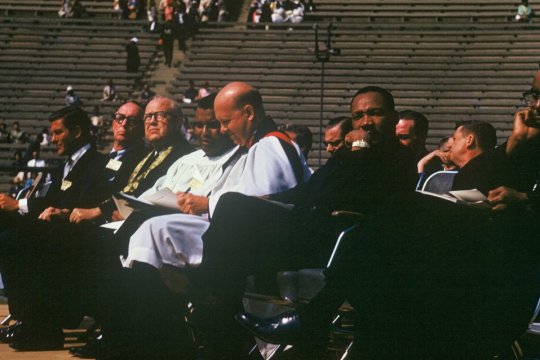
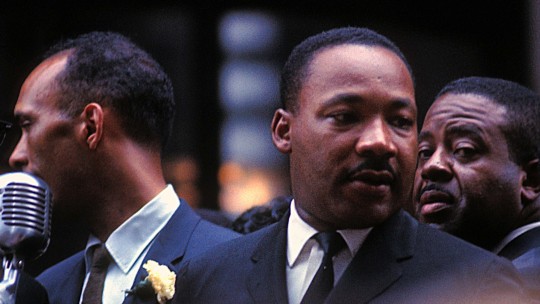

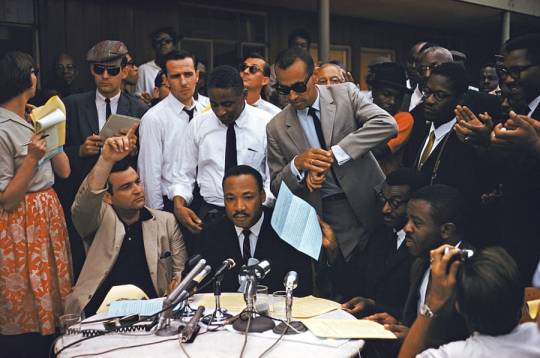
-fae
#black lives matter#blm#black lives still matter#martin luther king day#martin luther king#martin luther king jr#mlk day
12K notes
·
View notes
Text
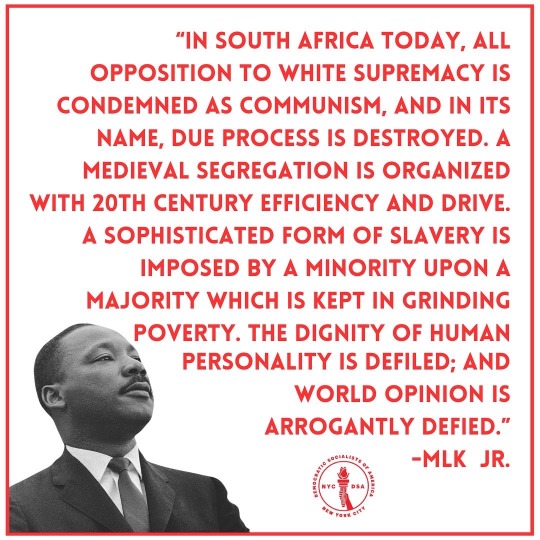
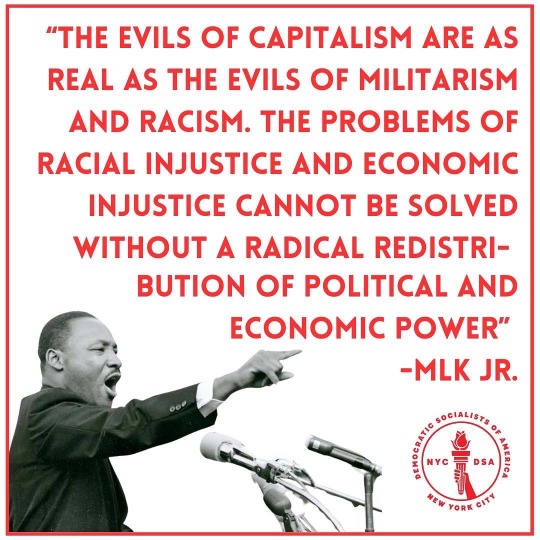
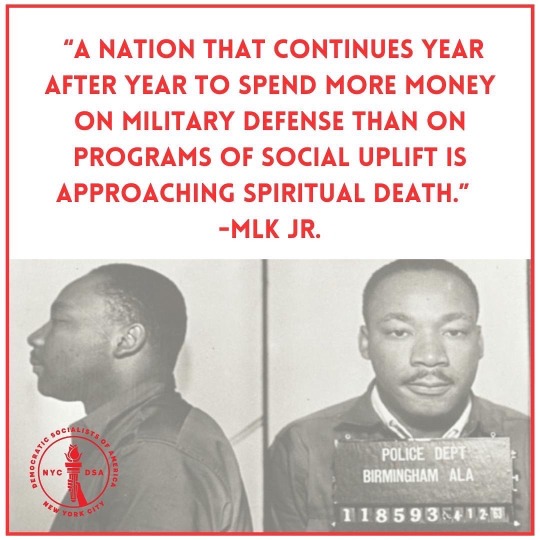
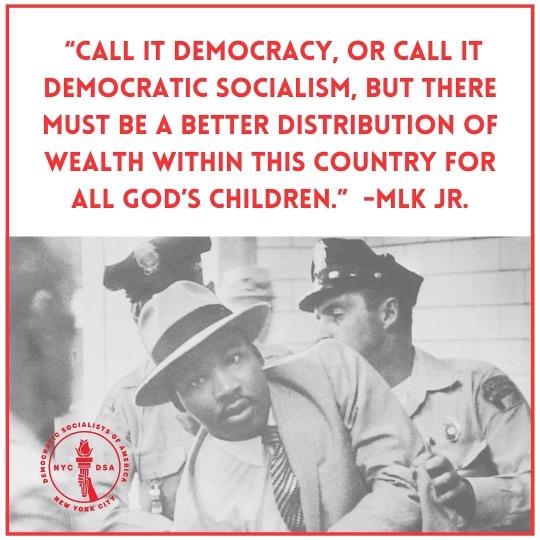
(X)
430 notes
·
View notes
Text
on this martin luther king day we shall recognize that until black people get equal housing, job, education, and numerous other opportunities, and until we dismantle the system that places them in places that are segregated from much of society, where they live in food deserts and have decreased access to clean water, in places with increased crime, amongst other issues, black people will never be able to have the same opportunities and equal rights as white people.
martin luther king fought up until his assassination to give black people equal economic opportunities, education opportunities, and access to the same roghts as white people. from his work sprung the civil rights and voting act, which was a victory for many people in the civil rights movement. though there has been progress, black people still face issues with housing, are more likely to get underpaid, are underrepresented in the popular vote in certain states, to face unequal opportunities in education alongside racism, and the voting act has been threatened numerous times.
we must continue to fight for black liberation and not let the voices of the civil rights movement die down.
the civil rights movement continues on
#martin luther king jr#civil rights#civil rights act of 1964#voting act#voting#racism#antiblackness#politics#us politics#martin luther king day
291 notes
·
View notes
Text
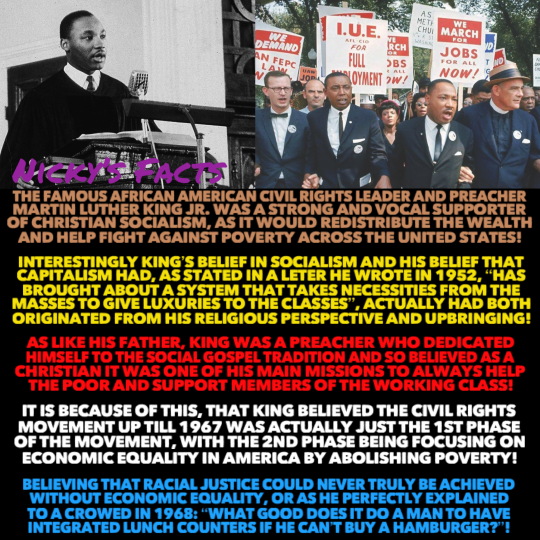
Martin Luther King Jr. was a Christian Socialist!
🕊️
#history#martin luther king jr#civil rights movement#christianity#social change#african american history#mlk day#historical figures#blm#i have a dream#socialism#american history#black tumblr#love not hate#role model#black lives matter#black excellence#black history#martin luther king day#social justice#1960s#united states#civil rights#nickys facts
144 notes
·
View notes
Text
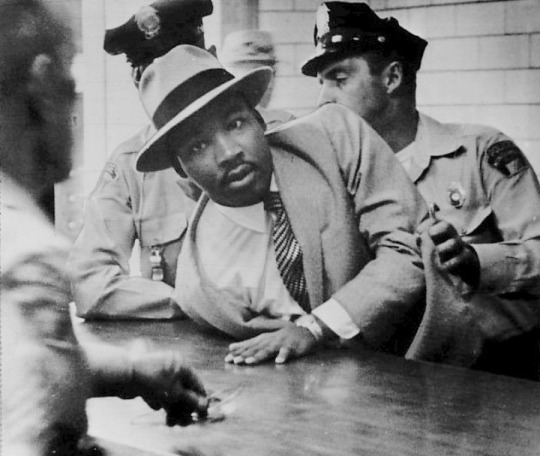
Martin Luther King Jr. was Arrested 29 times for these so-called crimes. Here are just a few occasions when he was arrested and why:
January 26, 1956 — He was arrested in Montgomery, Alabama as part of a "Get Tough" campaign to intimidate the bus boycotters. Four days later, on January 30, his home was bombed.
March 22, 1956 — King, Rosa Parks and more than 100 others were arrested on charges of organizing the Montgomery Bus Boycott in protest of Parks' treatment.
September 3, 1958 — While attempting to attend the arraignment of a man accused of assaulting Abernathy, King is arrested outside Montgomery's Recorder's Court and charged with loitering. He is released a short time later on $100 bond.
September 5, 1958 — King was convicted of disobeying a police order and fined $14. He chooses to spend 14 days in jail, but is soon released when Police Commissioner Clyde Sellers pays his fine.
October 19, 1960 — He was arrested in Atlanta, Georgia during a sit-in while waiting to be served at a restaurant. He was sentenced to four months in jail, but after intervention by then presidential candidate John Kennedy and his brother Robert Kennedy, he was released.
May 4, 1961 — He was arrested in Albany, Georgia for obstructing the sidewalk and parading without a permit.
April 12, 1963 — He and Ralph Abernathy were arrested in Birmingham, Alabama for demonstrating without a permit.
During his time in jail, he he wrote what is now known as his historic "Letter from Birmingham Jail."
June 11, 1964 — He was arrested for protesting for the integration of public accommodations in St. Augustine, Florida.
February 2, 1965 — He was arrested in Selma, Alabama during a voting rights demonstration, but the demonstrations continued leading to demonstrators being beaten at the Pettus Bridge by state highway patrolmen and sheriff's deputies.
Legendary civil rights activist Dr. Martin Luther King Jr. spent a night in the jail on a trespassing charge after he and others were arrested after they attempted to eat in the Monson Restaurant on June 11, 1964. The arrest was reported in The St. Augustine Record and is included in the state legislative committee's investigative report, "Racial & Civil Disorders in St. Augustine," February 1965.
•••
Martin Luther King Jr. fue arrestado 29 veces por estos supuestos “crímenes”. Estas son sólo algunas ocasiones en las que fue arrestado y el por qué:
26 de enero de 1956: Fue arrestado en Montgomery, Alabama, como parte de una campaña "Get Tough (Ponerse Firme)" para intimidar a los boicoteadores de autobuses. Cuatro días después, el 30 de enero, su casa fue bombardeada.
22 de marzo de 1956: King, Rosa Parks y más de 100 personas más fueron arrestados acusados de organizar el boicot a los autobuses de Montgomery. Esto en protesta por el trato que recibió Parks.
3 de septiembre de 1958: Mientras intentaba asistir a la lectura de cargos de un hombre acusado de agredir a Abernathy, King es arrestado frente al Tribunal de Registro de Montgomery y acusado de holgazanería. Poco tiempo después fue liberado, luego de pagar una fianza de 100 dólares.
5 de septiembre de 1958: King fue declarado culpable de desobedecer una orden policial y multado con 14 dólares. Eligió pasar 14 días en la cárcel, pero pronto lo liberan luego de que el comisionado de policía Clyde Sellers pagara la multa.
19 de octubre de 1960: Fue arrestado en Atlanta, Georgia, durante una sentada mientras esperaba que lo atendieran en un restaurante. Fue sentenciado a cuatro meses de cárcel, pero tras la intervención del entonces candidato presidencial John Kennedy y su hermano Robert Kennedy, fue puesto en libertad.
4 de mayo de 1961: Fue arrestado en Albany, Georgia, por obstruir la acera y desfilar sin permiso.
12 de abril de 1963: Él y Ralph Abernathy fueron arrestados en Birmingham, Alabama, por realizar una protesta sin permiso.
Durante su estancia en la cárcel, escribió lo que ahora se conoce como su histórica "Carta desde la cárcel de Birmingham".
11 de junio de 1964: Fue arrestado por protestar por la integración de alojamientos públicos en St. Augustine, Florida.
2 de febrero de 1965: Fue arrestado en Selma, Alabama, durante una protesta por el derecho al voto, pero las protestas continuaron y los protestantes fueron golpeados en el puente Pettus por patrulleros de carreteras estatales y agentes del sheriff.
El legendario activista de derechos civiles, Dr. Martin Luther King Jr., pasó una noche en la cárcel acusado de invasión de propiedad privada después de que él y otros fueran arrestados después de intentar comer en el restaurante Monson el 11 de junio de 1964. El arresto fue informado en el periódico The St. Augustine Record y está incluido en el informe de investigación del comité legislativo estatal, "Desórdenes Civiles y Raciales en St. Augustine", febrero de 1965.
#martin luther king jr#martin luther king day#blacklivesmatter#blacklivesalwaysmatter#blackhistory#history#blackhistorymonth#blackpeoplematter#blackhistoryeveryday#blackhistory365#blackhistoryfacts#black history is everybody's history#black history is world history#black history is american history#historyfacts#black history matters#black history month#black history#knowyourhistory#no justice no peace#historical#justice#share#justice system#english#spanish#read#civil rights#civil rights movement#martin luther king quotes
121 notes
·
View notes
Text
Happy MLK day
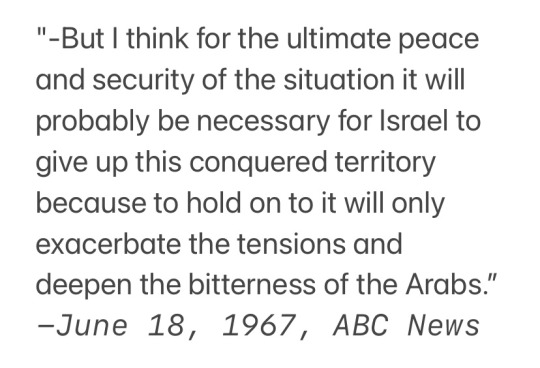
#martin Luther King quotes#mlk#mlk day#mlk 2024#martin luther king day#martin luther king jr#palestine#free palestine#quotes#Israel
74 notes
·
View notes
Text
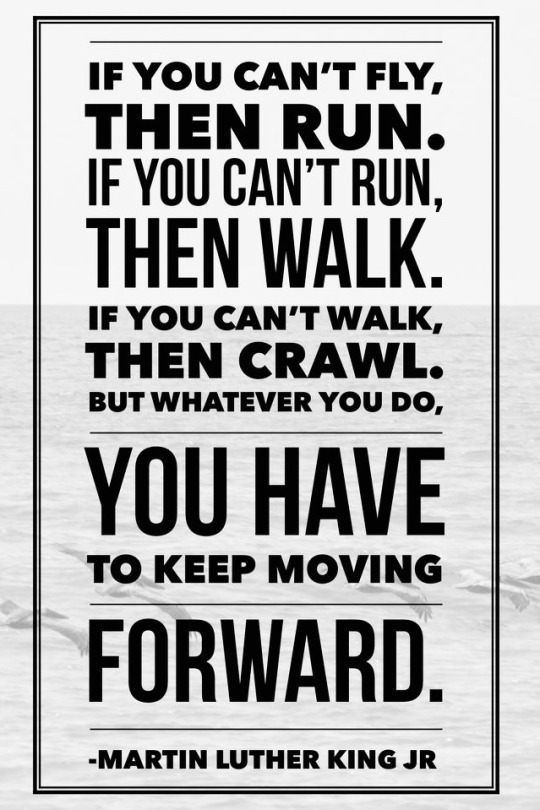
434 notes
·
View notes
Text
as a reminder of how fucking terribly racist the United States is at a fundamental level, up until 2000 at the latest several states refused to celebrate a holiday singularly named "Martin Luther King Jr. Day" and insisted that the holiday be shared with another historical figure.
what other historical figure you ask? well in most cases, robert e. fucking lee
251 notes
·
View notes
Text
Our true feelings about race and identity are revealed in six words
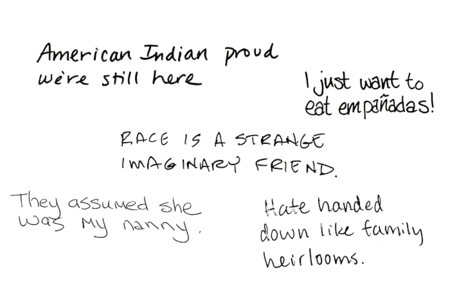
This is a poignant article about a project that Michele Norris started that tapped into people's thoughts about race in a profound way--using only six words. This is a gift🎁link, so anyone can read the full interactive article, even if they don't subscribe to The Washington Post. Below are some excerpts from the article:
I have always cringed when the accusations fly about someone allegedly “playing the race card.” It’s usually a proxy for “You’re making me uncomfortable, so please stop talking.” Or a diversionary tactic used to avoid having to speak about race with any kind of precision or specificity. A shorthand for “Just shut up.” And so, in 2010, I flipped the script, turning that accusatory phrase into a prompt to spark conversation. I printed 200 black postcards at my local FedEx Kinko’s on upper Wisconsin Avenue asking people to condense their thoughts on race or cultural identity into one sentence of six words. The front of the cards simply read:
Race. Your thoughts. 6 words. Please send.
I left the cards everywhere I traveled: in bookstores, in restaurants, at the information kiosks in airports, on the writing desks at all my hotels. Sometimes I snuck them inside airline in-flight magazines or left them at the sugar station at Starbucks. I hoped a few of those postcards would come back, thinking it would be worth the trouble if even a dozen people responded.
Much to my surprise, strangers who stumbled on the cards would follow the instructions and use postage stamps to mail their six-word stories back to me in D.C. Since my parents were both postal workers, this gave me an extra thrill. Here I was, doing my part to support the Postal Service. Who says snail mail is dead?
Half a dozen cards arrived within a week, then 12, then 20. Over time, that trickle became a tide. I have received more than 500,000 of these stories — and more arrive every day, though the vast majority of submissions now arrive through a website portal online. They have come from all 50 states and more than 100 countries.
Though limited to six words, the stories are often shocking in their candor and intimacy. They reveal fear, disappointment, regret and resentment. Some are kissed by grace or triumph. A surprising number arrive in the form of a question, which suggests that many people hunger not just for answers but for permission to speak their truths. It was amazing what people could pack into such a small package:
Reason I ended a sweet relationship
Too Black for Black men’s love
Urban living has made me racist
Took 21 years to be Latina
Was considered White until after 9/11
Gay, but at least I’m White
I’m only Asian when it’s convenient
To keep the conversation going, I created a complementary website for the Race Card Project, where people could submit their six-word stories online. Over time we added two words to the submission form: “Anything else?” That changed everything. People sent in poems, essays, memos and historical documents to explain why they chose their six words. The archive came alive. It became an international forum where people could share their own stories but also learn much about life, as if it were lived by someone else.
I highly recommend reading the entire article, using the above gift link. As an olive-skinned Italian American, with curly hair, I have often felt like I am a walking Rorschach test for race. Even though I'm classified as "white" in the U.S., I've had people ask me if I'm a Latina, a Native American, Black, Egyptian, Jewish, and even a South Pacific Islander. Given my history, here are my six words on race.
A book is not it's cover.
I welcome people adding to this post their own 6 words on race.
#race#six words#feelings about race and identity#martin luther king day#michele norris#the washington post#gift link
38 notes
·
View notes
Text

#malcolm x#martin luther king day#martin luther king jr#revolutionary#power to the people#black liberation#black history
293 notes
·
View notes
Text
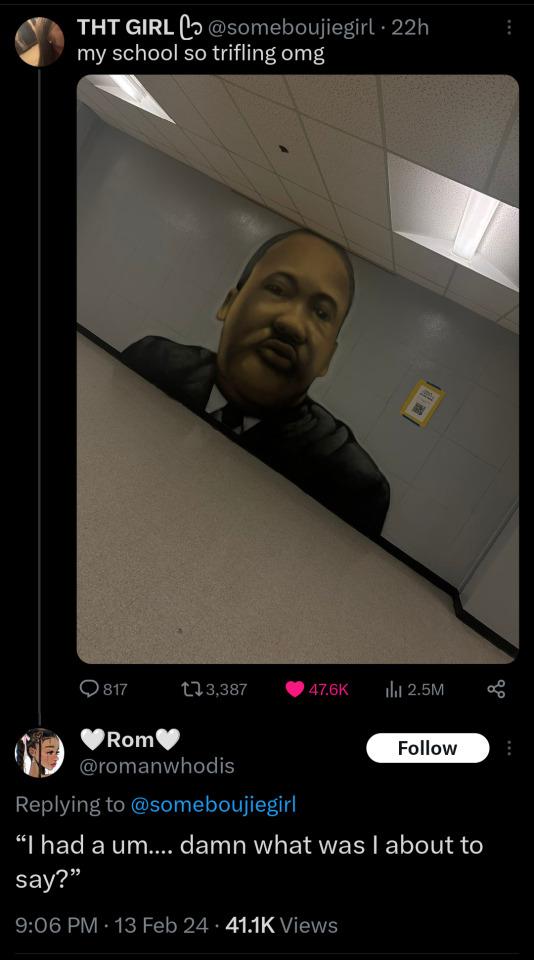
#funny#twitter#twitter meme#memes#funny memes#comedy#funny photos#funny post#screenshots#martin luther king jr#martin luther king day#martin luther king quotes#street art#murals#school#fan art
24 notes
·
View notes
Text
https://www.tiktok.com/t/ZTRpR4KLC/
-fae
#black lives matter#blm#black lives still matter#mlk#mlk day#martin luther king day#martin luther king#martin luther king jr
473 notes
·
View notes
Text
Today January 15th which is Martin Luther King jr. Day Israel posted a quote from him.
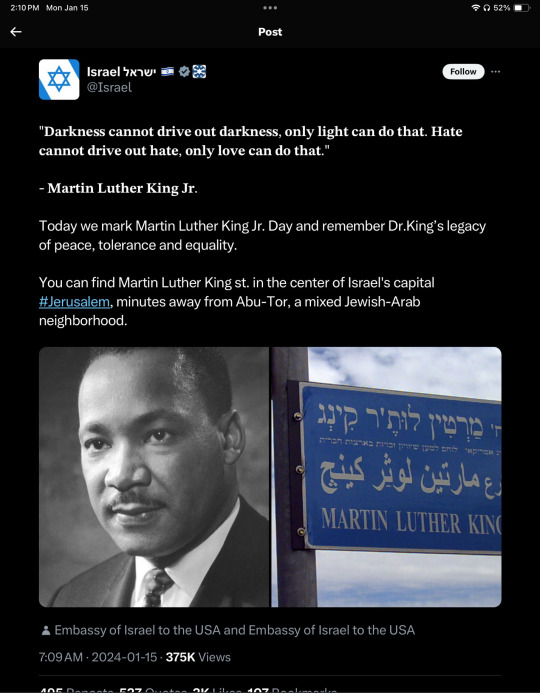
He may have supported Israel’s right to exist but do you really honestly think he would have supported the Genocide? Do you think he would have supported the discrimination and abuse of the Palestinians in the west bank? Honestly just sit and think for a second, would Martin Luther King jr. support the Apartheid? The displacement of millions of Palestinians throughout its entire history? Do you think someone who spoke and advocated for the end of the Vietnam war would support this Genocide and horrific bombing campaign against the innocent people of Gaza?
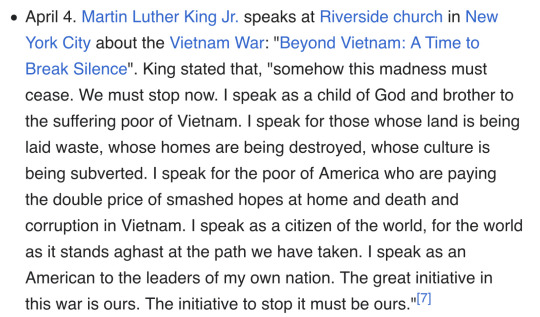
#free palestine 🇵🇸#free palestine#i stand with palestine 🇵🇸#from the river to the sea palestine will be free#ceasfire now#twitter#palestine#israel#martin luther king jr#martin luther king day#i am definitely not an expert on this#please inform me if i am wrong
39 notes
·
View notes
Text
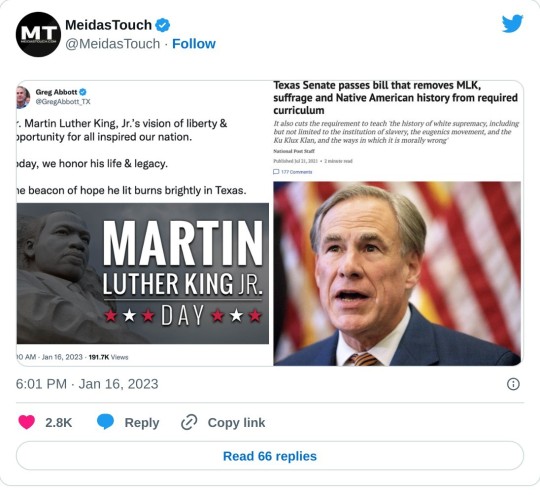
#us politics#2023#dr. martin luther king jr.#martin luther king jr#martin luther king day#texas#meidas touch#gov. greg abbott#women's suffrage#native americans#native american history#us history#education reform#critical race theory#white supremacy#american slavery#eugenics#ku klux klan#republicans be like#conservatives be like#fascists be like#gop#conservatives#republicans#racists
159 notes
·
View notes
Text

By: Ron Kapeas
Published: Jan 8, 2024
JTA — In a speech marking Martin Luther King Jr. Day weekend, Rep. Ritchie Torres likened protesters who have celebrated Hamas’s October 7 massacres to white people in the Jim Crow era who celebrated after the lynching of Black people.
“I was profoundly shaken not only by October 7, but by the aftermath,” Torres, a Black Bronx Democrat, said Friday in a speech at Central Synagogue, a prominent Reform congregation in midtown Manhattan. “I found it utterly horrifying. To see fellow Americans openly cheering and celebrating the deadliest massacre of Jews since the Holocaust. And for me, the aftermath of October 7 revealed a barbarity of the American heart that reminded me of an earlier and darker time in our nation’s history, a time when the public mobs of Jim Crow would openly celebrate the lynching of African Americans.”
Protests have proliferated since October 7, when Hamas terrorists murdered some 1,200 people, kidnapped around 240 and brutalized thousands more in an invasion from Gaza. They have grown as Israel has waged a war in Gaza to eliminate the terror group, and especially as casualties mounted: So far, close to 25,000 Palestinians have been killed, according to the Hamas-run Gaza health ministry, which does not differentiate between fighters and non-combatants and is also believed to tally civilians killed by errant rockets fired by terror groups.
A number of the protests have decried the October 7 violence on Israelis, but others have skated over the initial massacres or have embraced Hamas and described its atrocities as resistance.
Torres, a member of the progressive caucus in Congress, has garnered a reputation as an unstinting supporter of Israel. He has duked it out online with fellow progressives in debates over Israel, a dynamic that has only intensified since October 7. Torres is heavily funded by AIPAC and donors aligned with the pro-Israel lobby, and spoke at a massive rally for Israel in Washington on November 14.
In his speech, Torres alluded to the controversies that assailed elite universities after the presidents of Harvard, the Massachusetts Institute of Technology and the University of Pennsylvania told Congress that calls to commit genocide against Jews did not necessarily violate the schools’ codes of conduct. The ensuing uproar drove Harvard’s and Penn’s presidents to resign.
“What we’ve seen in the aftermath of October 7, is appalling silence and indifference and cowardice from so called leaders in our society from institutions that we once respected and admired,” he said. “And if we as a society cannot bring ourselves to condemn the murder of innocents with moral clarity, then we must ask, what are we becoming as a society? What does that reveal about the depths of antisemitism in the American soul?”
I had the honor of delivering the annual MLK sermon at Central Synagogue.
My speech touches on a range of topics and themes: October 7th, Jim Crow, Leo Frank, MLK, Elie Wiesel, silence, indifference, moral clarity, nonviolence, Israel, Am Yisrael Chai, Hatikvah, and hope. pic.twitter.com/stxqxzgyLi
— Ritchie Torres (@RitchieTorres) January 16, 2024
Central is a locus for some of the city’s wealthiest liberal Jewish families, many of whom are also firm supporters of Israel. Dr. Shonni Silverberg, the synagogue president, introduced Torres as a champion of progressive priorities as well as an advocate for Israel, and noted that he is the first openly LGBTQ representative elected from the Bronx.
“Ritchie remains steadfastly focused on the priorities of his South Bronx constituents, expanding access to safe and affordable housing, rebuilding New York economically and ensuring that no child goes hungry and that all receive a good education,” she said. “But he has also shown himself both in and out of Congress to be a great friend of the American Jewish community and Israel.”
--
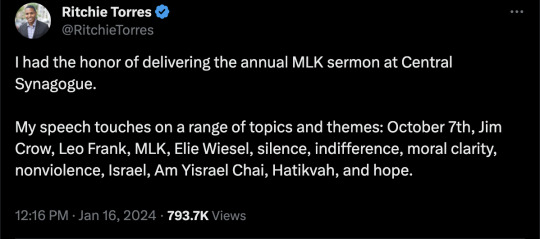
==
I was shocked, but not surprised. Shocked at how openly, how loudly and how quickly pro-Hamas, pro-terrorism supporters emerged from their Postcolonial Studies, Gender Studies, Intersectional Feminism Studies and other fraudulent sewers in the ivory towers long before Israel ever fired a shot back.
I was not surprised, however, since antisemitism is a cornerstone of Intersectionality, as I posted about more than two years ago:
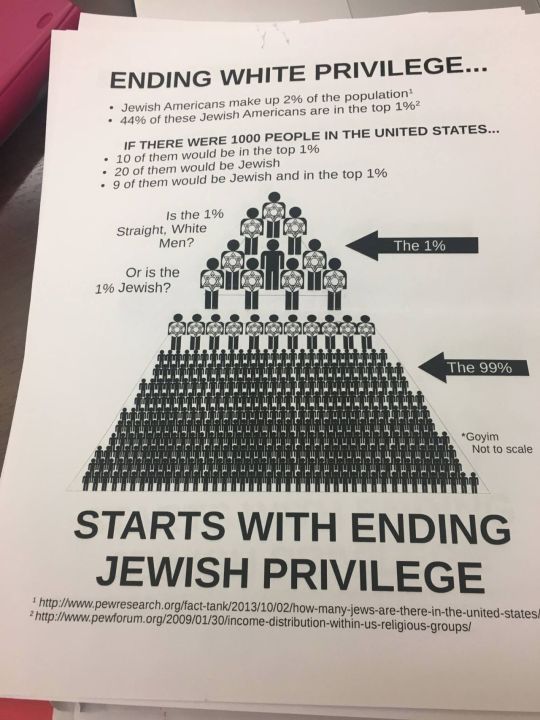
I naïvely expected that they'd go, "whoa, we didn't mean it like that, that's not what we were after," the standard No True Scotman tactic to distance their enlightened antisemitism from the antisemitism of murderous Islamic jihadists.
But they went the other way and leaned into it, cheering it on, while others tried to gaslight everyone with the usual array of denials that they weren't saying what they were openly saying, and that anyway, if they were saying it, that's not what they meant.
#Ritchie Torres#MLK Jr Day#MLK Day#Martin Luther King#Martin Luther King Day#Martin Luther King Jr Day#islamic terrorism#hamas#hamas supporters#pro hamas#pro palestine#pro palestine is pro hamas#antisemitism#October 7#Oct 7#hamas massacre#october 7 massacre#exterminate Hamas#religion is a mental illness
21 notes
·
View notes
Text
1403- Tengo un sueño, un solo sueño, seguir soñando. Soñar con la libertad, soñar con la justicia, soñar con la igualdad y ojalá ya no tuviera necesidad de soñarlas"
(Martin Luther King)
#palabras#frases#textos#textos nocturnos#pensamientos#escritos de amor#culture#books & libraries#un sueño#sueños#tengo sueño#noches de sueño#mi sueño#libertad#vida#amor#noche#vivir#martin luther king jr#martin luther king day#martin luther king quotes
16 notes
·
View notes